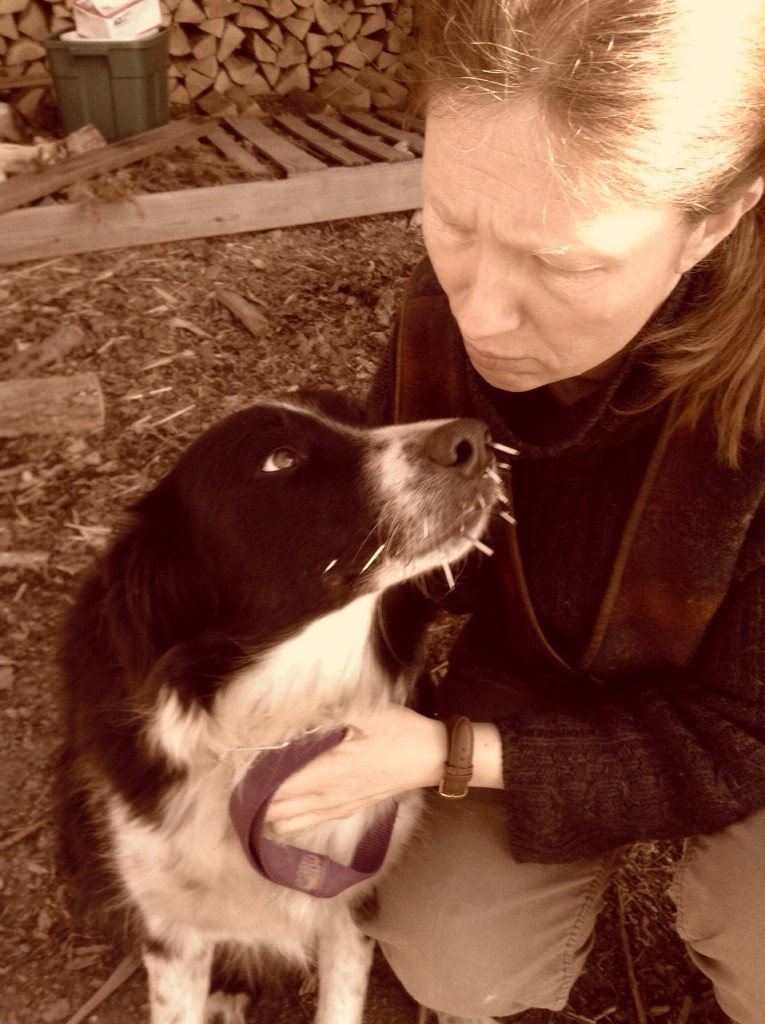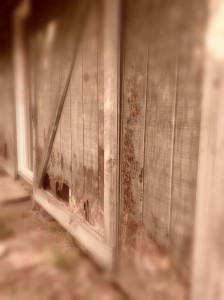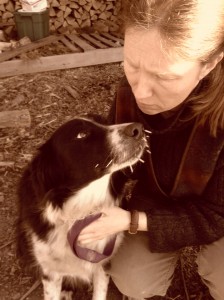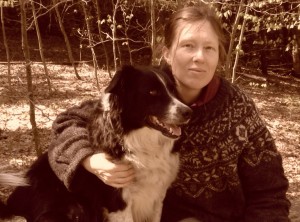The first summer we lived here, Bob awoke one night to a chewing sound he heard outside. He went out to investigate. As he shined his light on the door of our shed, a porcupine unabashedly turned and looked at him before returning to his treated lumber supper. Bob tried to yell at him to make him go away. The porcupine ignored him. Bob went back to bed. The chewing woke him up each night for weeks afterward. He put hardware cloth on the shed door. The porcupine used it as a helpful ladder to climb higher and gnaw a fresh section. He considered bringing the rifle up from the farm. But since we are living on the edge of a giant state forest, we couldn’t bring ourselves to do it. Truly, we were encroaching on the porcupine’s turf. What right did we have to shoot him? He didn’t seem to be causing any other troubles. That same porcupine (or perhaps one of his progeny) has kept coming back for fifteen years, slowly eating away the door to our shed. We eventually learned to cover our ears to the noise and turn a blind eye to the damage.
Then Nick came to us last summer. We needed a dog who would bark at predators, patrol the boundaries of our property, and leave his scent as a deterrent to the local bears, who had recently identified our beehives as their preferred snack bar. Nick’s family was moving to the California suburbs, and he was in need of a new home where his 70 pounds of bulk could roam freely, where he would be welcome to mark trees and bushes to his heart’s content, where his persistent shrill bark would be tolerated.
The transition was almost seamless. At first, Nick took to sleeping under my side of the bed, or, preferably, if he could get away with it, on top of me; which left the property unguarded, and the bees open to further bear attacks. But eventually, with a little discipline and lots of cuddles and pillow talk over the winter, he settled in and accepted a proprietary role in the management of our household. He took as his bed a pillow near where I sleep, beside a floor-level window upstairs, where he can watch over the front field, barking and snarling at wildlife intruders throughout the night. And this spring, he has been happily patrolling the property, marking the country side with his unique brand of urinated No Trespassing signs. He chases rabbits from the garden, and keeps the bears at a safe distance from the hives. He has blended in so well, I almost don’t notice him in the frenzy that is spring.
While Nick roams the woods and fields surrounding the house to secure our borders, inside the patrol lines, we must move at a breath-taking pace in order to keep up with our own family farm demands. We race along the ground outside, trying to stay ahead of the weeds and the livestock. Meanwhile, inside the house, domestic tranquility is surrendered for the sake of packing wool, rendering fat, stirring soap, prepping orders, dipping candles, throwing together meals that must be eaten in haste. Winter allows for a second pot of coffee beside the wood stove, coupled with long stretches of uninterrupted knitting or napping. But spring shocks the dormant body like a bucket of icy water, commanding frenzied activity at every passing minute.
Nick assiduously patrols and protects the aura of chaos that surrounds our family; but within it, as the orchestrating mother, I am the nucleus, driven by purpose and direction. My body and mind are trained after so many seasons to see through the entropy and find order. I keep the schedules. I know who will eat what on each day. I know at what hour I must rise to do my writing, by what hour I need to have a meal on the table, who needs to be at what appointments, at what time in the day I can respond to phone calls, which local children will be arriving at any given hour to play, and whether they will come to our house or go to the farm. I know what farm products will be produced on any particular afternoon. I know what time supper needs to be cleared from the table, what time teeth need to get brushed, and exactly how many minutes of story time may be dispensed before I roll over and switch off the light, so that I may obtain adequate slumber before the regimen starts anew at 4am. There is laughter and love along the way, but admittedly, there is no moment without drive and purpose.
And then came the night a few weeks ago, when Nick detected an intruder from his watchtower. Growling and barking furiously, he roused Bob from bed, insisting that he be permitted to confront the insouciant interloper who had crossed his boundaries. Dopey with sleep, Bob obeyed the dog. He promptly regretted it when Nick’s roaring charge abruptly ceased with a high pitched yelp, followed by a fevered bolt back into the house.
At that point, I gave up my carefully calculated slumber allotment to join my husband, knowing exactly what we faced. Nick had finally met our resident porcupine. He whimpered before us in the kitchen, frantically trying to paw the quills from his muzzle, looking at us with pleading eyes to do something. But this case was beyond our medical capacity. He’d require a trip to the vet in the morning. We moved over to my office, where the noise wouldn’t disturb the girls. Bob sat down in the little cubby beside my desk, which we keep made up as a bed for periodic relief when one of us chooses to work through the night. “Put Nick in the mudroom,” I directed him, already computing in my mind how this impending vet visit would impact the morning schedule (and our thin wallets).
Bob rarely employs words when he argues. He works his big brown eyes into myriad expressions, leaving me to soliloquize through most of our conflicts. At my instructions to put the dog in the mudroom, his eyes gaped in horror, as though I was directing him to send Nick to a gas chamber.
“We all need sleep,” I argued back.
Next, his eyes hardened, this time searing the words “ruthless, heartless bitch” into my mind.
“We had dogs who got quills all the time growing up,” I tried reasoning with that glare. “We’ll get him to the vet in the morning, and he’ll be fine.”
Taking Bob’s side in the argument, Nick began pawing at his face and whining. Bob gently held the dog’s head and stroked his ears, keeping him from driving the quills deeper. He reclined back into the cubby, put his legs under the blanket, then invited Nick to settle down on top of him, where he cradled the dog’s meaty head and gently stopped him from pawing his face. The argument thus concluded, my husband finally spoke to me:
“Go back to bed.”
I did. But I can rarely fall back to sleep once I’ve been disturbed. My mind flies to my mental check-off list: What writing do I have to do in the morning? Have I done the research? Do I have any unanswered emails? What appointments do we have? When am I going to get the garden cleaned out? Exactly how many hours of sleep have I had? How many hours do I need to complete a night’s rest? Since I can’t sleep, what could I be getting done right now?
It was two thirty in the morning. I padded back down to the office. Bob had turned the lights down and was holding Nick in the cubby. I switched on the light and turned on the computer. “I’ll stay up with him,” I sighed. “I can at least get some work done in the meantime.”
Victorious, Bob went back to bed. I began sorting through my files. Nick started pawing at his face. “No!” I commanded. He didn’t heed. I held his paw. He looked at me pleadingly. I put his paw down and returned to my desk. He began rubbing his face into the floor. “No!” I commanded again. He looked at me, then began digging at himself with his paws once more, driving the quills further into his nose. I left the computer a third time and took his head in my hands. He wriggled his massive form up against my chest, a puppy once more, pleading for the comfort of an embrace.
I sighed, stood up, and moved to the cubby, where I climbed under the covers. Tapping the blanket, I gave him permission to join me. He leapt up, knocking the wind from my chest before settling his black and white mass over my body. I stroked his head, then ran my hands down the length of his back. He rested his quill-infested face along my upper arm. Instinctively returning to my role as family nucleus, I went back to calculating the number of hours of sleep I might be able to obtain, then decided to close my eyes and try for rest — one thing I might be able to get done in this situation. My hand went still.
And Nick began to paw at himself again.
Finally, I understood. I had to sit with the dog, and just pet him. I couldn’t write. I couldn’t sleep. I couldn’t get another damn thing done. All I could do was stay awake in the dark and try to comfort this creature until we could get some help for him.
We spent three hours lying together in that cubby, waiting for morning. Nick drifted in and out of sleep while I kept vigil. And as we nestled there together, I panicked about all that I was not getting done, about all the time I was wasting. It wasn’t just the three hours of productivity lost to nursing a dog. It was the ripple effect of the lost productivity that would ensue from lost sleep.
It took nearly an hour of fretting like this before I realized that I was holding medicine in my hands. Sitting alone in the dark with Nick, I was forced to examine my own behavior: I worry incessantly about productivity. But in a life by my own design, what, exactly, are the repercussions if I fail at completing my to-do list?
None, really. Maybe I lose a few dollars here or there from missed sales. That’s about it. My business partners are all family. They will step in and help wherever needed. We cover for each other. My customers are like family. If I don’t have what they want one day, they’ll usually come back later. Nobody is going to fire me. Nobody minds a mess. Nobody is holding me to a deadline.
Except me.
My high expectations and fierce drive cleaved a path for my family to thrive in an alternative lifestyle. But what is the purpose of all the freedom and self-reliance I’ve cultivated, if I am so obsessed about getting stuff done that I can’t let go and just comfort a dog for a few hours? The point of my life is to be free to give myself over to those things I care about most. And in that moment, that thing was a 70 pound baby who’d just met his first porcupine.
I felt the knot that seems perpetually balled in my stomach begin to unravel. My heart rate slowed. I held that dog and stroked his fur, and together we drifted through a series of muzzy hours until the sun came up. It will be a night I will hold in my memory for years to come.
The quills are all gone now. Nick is back to patrolling our borders, the porcupine is back to gnawing on our shed door, which will have to be replaced one of these days. Nick seems to have chosen to ignore his presence. I am back to directing and coordinating and producing our family life. I love doing it. I always will. But inside me, there’s just a little more peace, and a little more understanding that things fall apart, no matter how much force and calculation go into holding them together. And those experiences are just as rich as the daily tasks I’ve chosen through intentional living. I’m thankful to that big black and white dog, and that ornery porcupine, who helped me to remember that.




Another True Confessions philosophy winner!
Still another point of view, from when I took same trip to vet. Vet, smiling sweetly:”I LOVE porcupines. They put my kids through college.”
I had to smile. Been there . . . done that. My old dog Honey, the love of my life, who passed away last year would bring a dead groundhog to my door occasionally. One day, I noticed a dead one in the drive as I went out to greet my three grandchildren and daughter who had just arrived for a visit.
“There’s a dead groundhog,” I said by way of “show and tell.”
Six year old Isabella, walked over and peered down. She paused, then said,
“It blinked at me.”
My daughter, fretted about its pain, got a shovel, with the idea of gently taking it in the woods so it could choose to live or die.
During this process, Honey appeared dazed and confused. She couldn’t look at me or the groundhog but walked around fretting. As Ashley tucked the shovel under the groundhog, the critter emitted a high pitched, ear-piercing SCREAM. Children dogs, moms, grandmothers . . . . we ran in all directions as the animal drug its broken leg scuttered crab-like into the woods.
The ending of my story is the same as yours. No more dead groundhogs. In fact, when one did appear in the garden, Honey barked at it but would not look its way.
Glad you sweet brave dog recovered and is doing well.
PS. I also know the other story about losing perspective. For those of us (not you, but me) who judge our worth by what we accomplish, it is easy to lose sight of what is important.
Thanks for sharing your story.
All the best,
Lucindy at http://www.terrapincovefarm.com
As always, I enjoyed reading your story, and the message it brought. It is important to keep that prospective in the busy lives we all live. The last dog we had, Spanky, met up with a porcupine on a Sunday evening, so we had to wait until Monday morning to take him to the Vet. I gave him a sleep aid pill so that he could rest through the night. I don’t know if a Veterinarian would agree with that, but he was a large dog so half the human dose, i figured, would not harm him. It helped us all get through the night and to the Vet in the morning we went.
Shannon, you continue to inspire me and help me gain a new perspective on my life. I am 64 years old and not working outside the home. We do not have a farm but we strive to be independent of industrial ag by growing and preserving/storing all our own vegetables. We buy only locally and sustainably raised meats. As a result, we have earned independence from industrial ag. Also, as a result, I get obsessed with my seedlings, gardening and all that it involves. I recently had back and knee problems and found myself getting depressed and bitchy because I couldn’t ‘keep to the work schedule.’ We have a large property and also grow and maintain a lot of ornamental plantings. I get very fussy about those too. I found myself being very critical about everything my husband did to help. It just wasn’t good enough in my opinion. At the end of the growing season, I always wonder where the summer went and why didn’t I enjoy it more? I can see why now and am reminded by your wonderful essay, that the world will not end if I deviate from ‘the schedule/plan’ once in a while. It’s very liberating!
Thank you again for your insight. We lived in Ithaca, NY for 30 years (now in NH, born and raised in CT). We go back to visit once in a while and I would love to meet you and see your farm sometime if it wasn’t too much of an imposition. Do you ever time for brief visits? Just a quick hello, handshake and thank you.
What a wonderful story. And your description of this time of year on a farm, when “spring shocks the dormant body like a bucket of icy water” is so true.
Our beloved dog, a German Shepherd, was convinced he had to protect us from skunks. That Included a dead one he discovered lying by the street. We washed the dog mightily and then my husband carried the skunk into the woods on a shovel. Our dog rushed out that very same day to grab the skunk corpse and shake it. We washed him mightily again, this time burying the skunk and covering the grave with stones. A musky peace at last. Our dog passed away at nearly 14 years of age. Now every evening an entire family of skunks hangs out under our bird feeder eating seed tossed out by impatient songbirds. They don’t bother us, they’re even sort of cute, but we still miss our dog.
Hi Shannon,Jimmy Hayes here, the guy with the big can of tomatoes.Years ago a friend was staying with me and his sheppard ran into a porcupine at night.In the morning he sat patiently as I pulled about 15 out of his chin and nose with a pair of plyers.When the last one was pulled his tail began to wag.He was fine after.I think that’s all a vet does, but I am not sure.
Thanks, Jimmy! And BTW, the tomatoes were amazing!